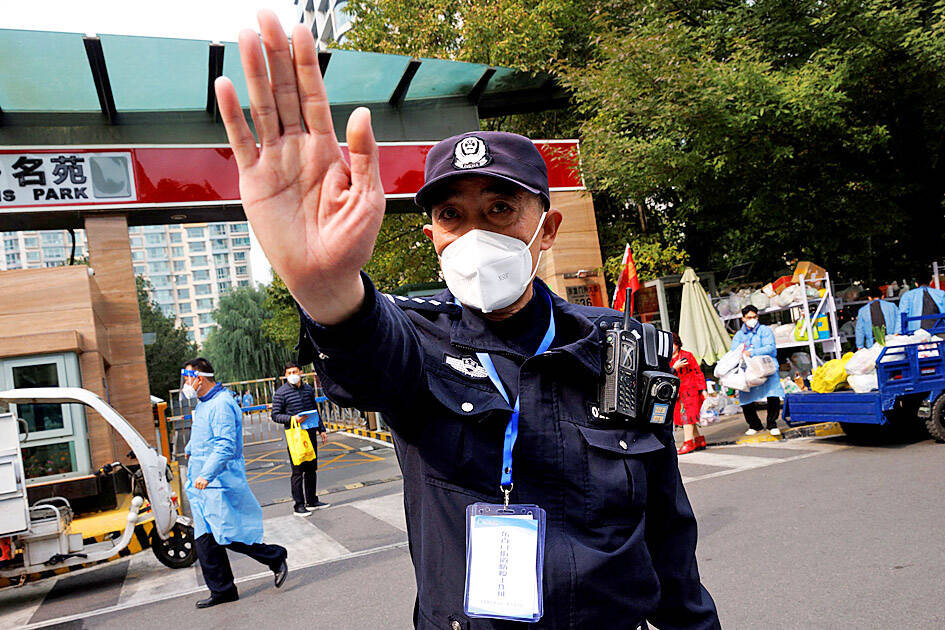China is considering cutting the time that inbound visitors have to stay in COVID-19 quarantine from 10 to seven days, Bloomberg News reported yesterday, citing people familiar with the matter.
A strict “zero COVID-19” policy has been a damper on the world’s second-largest economy, contributing to concerns about a global recession, and international investors are closely watching for any sign of a relaxation of the rules.
China requires travelers to isolate for 10 days on entry into the country, with seven days in a hotel room, followed by three days of home monitoring.

Photo: Reuters
Officials are targeting a cut in the quarantine period to two days in a hotel and then five days at home, Bloomberg said.
The Chinese National Health Commission did not immediately respond to a fax seeking comment on the report.
The news agency said there was no clarity on how the new rules on home quarantine would apply to foreigners and other visitors without a residence in China.
In the past few days, China has repeated its pledge to stick to its “zero COVID-19” policy, despite growing public frustration with it and its toll on the economy.
While China’s approach to containing outbreaks remains tough, it is mindful of not excessively curbing cross-border travel for reasons other than leisure, such as for business and study.
China previously reduced its quarantine requirements on inbound travelers, including Chinese nationals, at the end of June. Since then, more international passenger flights in and out of China have also been allowed to resume.
Meanwhile, the capital, Beijing, has dialed up measures to stop COVID-19, strengthening public checks and locking down some residential compounds after a quadrupling of its case load in the past few weeks, just as a key Chinese Communist Party congress entered full swing.
The city of 21 million people yesterday reported 18 new locally transmitted cases for the previous day, bringing the tally for the past 10 days to 197. That is four times more than the 49 infections detected in the previous 10-day period.
While the number of cases is very small compared with other countries, China’s “zero COVID-19” policy has compelled the capital to ratchet up preventive measures, particularly with the party holding its once-every-five-years congress this week.
Beijing’s health authority called for stronger screening of risky individuals and meticulous checks on people entering crowded places, including supermarkets and gyms.
Some residential compounds with suspected cases were put under three-day lockdowns that could be extended if new infections emerge.
“Ensure that no one is overlooked,” Beijing’s health authorities said.
Shanghai, like many other Chinese cities battling sporadic COVID-19 outbreaks, revealed this week that it was planning to build a 3,250-bed quarantine facility on a small island close to the city center.

ECONOMIC WORRIES: The ruling PAP faces voters amid concerns that the city-state faces the possibility of a recession and job losses amid Washington’s tariffs Singapore yesterday finalized contestants for its general election on Saturday next week, with the ruling People’s Action Party (PAP) fielding 32 new candidates in the biggest refresh of the party that has ruled the city-state since independence in 1965. The move follows a pledge by Singaporean Prime Minister Lawrence Wong (黃循財), who took office last year and assumed the PAP leadership, to “bring in new blood, new ideas and new energy” to steer the country of 6 million people. His latest shake-up beats that of predecessors Lee Hsien Loong (李顯龍) and Goh Chok Tong (吳作棟), who replaced 24 and 11 politicians respectively

Archeologists in Peru on Thursday said they found the 5,000-year-old remains of a noblewoman at the sacred city of Caral, revealing the important role played by women in the oldest center of civilization in the Americas. “What has been discovered corresponds to a woman who apparently had elevated status, an elite woman,” archeologist David Palomino said. The mummy was found in Aspero, a sacred site within the city of Caral that was a garbage dump for more than 30 years until becoming an archeological site in the 1990s. Palomino said the carefully preserved remains, dating to 3,000BC, contained skin, part of the

Russian hackers last year targeted a Dutch public facility in the first such an attack on the lowlands country’s infrastructure, its military intelligence services said on Monday. The Netherlands remained an “interesting target country” for Moscow due to its ongoing support for Ukraine, its Hague-based international organizations, high-tech industries and harbors such as Rotterdam, the Dutch Military Intelligence and Security Service (MIVD) said in its yearly report. Last year, the MIVD “saw a Russian hacker group carry out a cyberattack against the digital control system of a public facility in the Netherlands,” MIVD Director Vice Admiral Peter Reesink said in the 52-page

‘WATER WARFARE’: A Pakistani official called India’s suspension of a 65-year-old treaty on the sharing of waters from the Indus River ‘a cowardly, illegal move’ Pakistan yesterday canceled visas for Indian nationals, closed its airspace for all Indian-owned or operated airlines, and suspended all trade with India, including to and from any third country. The retaliatory measures follow India’s decision to suspend visas for Pakistani nationals in the aftermath of a deadly attack by shooters in Kashmir that killed 26 people, mostly tourists. The rare attack on civilians shocked and outraged India and prompted calls for action against their country’s archenemy, Pakistan. New Delhi did not publicly produce evidence connecting the attack to its neighbor, but said it had “cross-border” links to Pakistan. Pakistan denied any connection to